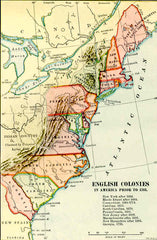The Origins of Columbus Day
 When our Georgian Girl, Lydia Peyton, landed in Colonial Boston in 1760, Boston’s Puritanical founders frowned upon holiday celebrations as decadent, indulgent and unnecessary, much to her dismay. It would seem everything was different in this strange New World. In the mid-1600’s one may even be fined for displaying their festive spirit. Imagine!
When our Georgian Girl, Lydia Peyton, landed in Colonial Boston in 1760, Boston’s Puritanical founders frowned upon holiday celebrations as decadent, indulgent and unnecessary, much to her dismay. It would seem everything was different in this strange New World. In the mid-1600’s one may even be fined for displaying their festive spirit. Imagine!
Now, of course Americans throw themselves full throttle into their holidays. Whilst European inspired, two-week breaks are rare, sprinkled generously throughout the calendar are three-day weekends and memorials celebrating anything from trees to US Presidents.
This 12 October comes one such unique holiday, Columbus Day, the official day Christopher Columbus ‘discovered’ America. Fixed on the second Monday of October, this year it falls on the exact day of Columbus’ landing. As early as the 18th century Americans marked their calendar to honour the explorer’s achievements and Italian-American heritage with parades, festivals and religious ceremonies. In 1937, after intense lobbying by fraternal order Knights of Columbus, President Roosevelt made it an official Federal holiday.
Of course today we know Columbus did not actually land in America, but the Bahamas, nor was he the first European explorer to properly discover the New World, rather one with the good fortune of favourable PR. (Columbus Day has a far nicer ring to it than say Leif Erikson Day, no?). Such is his overwhelming influence we now have several US cities and America’s very own capital ( District of Columbia ) named after him. Indeed, it is thanks to Columbus we still refer to the Caribbean as the West Indies and that Native Americans were, until recently, mistakenly known as Indians, a consequence of Columbus’ original geographical miscalculation mingled with a dash of hubris. Notwithstanding this and details of who landed where first, it was Columbus and his voyages that heralded the dawn of the “Age of Exploration”.
Not without controversy, Columbus’ critics argue his expeditions hallmarked the beginning of European invasion, colonization and ill-considered exploitation of the New World. Some US States now oppose it, preferring alternative holidays commemorating their own indigenous cause. Whilst Columbus may no longer be revered in American classrooms as a founding hero, for better or worse, his legacy casts a long shadow over American history and culture, however one wishes to celebrate it. One thing is certain: most everyone welcomes the long weekend!

Comments
0 Comments